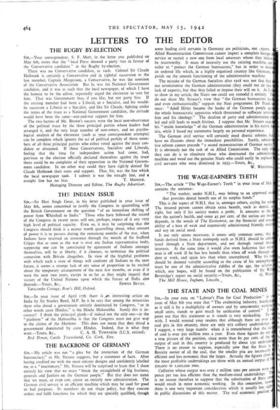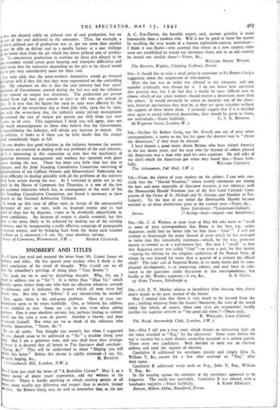THE STATE AND THE COAL MINES
gr te
SIR,—In your note on " Labour's Plan for Coal Production in issue of May 8th you state that " The coalmining industry, handica as it still is by a multiplicity of owners and by uneconomic workin small units, stands to gain much by unification of control." I point out that this statement as it stands is very misleading. To with, I would remind your readers that although there are over 2 coal pits in this country, there are only 972 colliery undertakings. I suggest, a very large numbe_ when it is remembered that the ou of coal is over 200 million tons a year. Even those figures do not a true picture of the position, since more than 8o per cent. of the output of coal in this country is produced by about 13o undenaki There is no reason to suppose, especially now that the State .is Royalty owner of all the coal, that the smaller pits are necessarily efficient and less economic than the larger. Actually the figures show the most profitable undertakings are those with an annual output of f 500,000 to t,000,000 tons.
Collieries whose output was over 2 million tons per annum were pence per ton less efficient than the medium-sized undertakings. is no reason therefore to suppose that the substitution of State would result in more economic working. In this connexion, ho there is one very important consideration which is usually lost sigh in public discussions of this matter. The real economic Position
does not depend solely on pithead cost of coal production, but on cost of the coal delivered to the consumer. Thus, for example, a whose pithead cost of production was 5s. per ton more than another may be able to deliver coal to a nearby factory at a cost shillings on lower than from the pit which has lower pithead cost of produc- To concentrate production in wartime on those pits alleged to be economic would create great housing and transport difficulties and
d mean that the industries depending on the pits to be closed would e to pay very considerably more for their coal.
Your note adds that the mine-workers themselves would go forward di better w;11 if they felt that they were represented on the controlling r. My comment on this is that the coal industry had four years' rience of Government control during the last war and the influence this control on output was disastrous. The production per person ed frtAn 248 tons per annum in 1917 to 187 tons per annum in o. It is true that the figures for 1919 to 1920 were affected by the seduction of the seven-hour day as from July 16th, 1919, but by 1922, en with the seven-hour day, the industry under private .management restored the rate of output per person per shift from just over cwts. to 18 cwts. This experience, I think you will agree, does not much encouragement to those who believe that the Government, requisitioning the industry, will obtain any increase in output. On contrary, it looks as if there can be little doubt that the output d immediately begin to fall.
No one doubts that good relations in the industry between the owners miners are essential in dealing with war problems of the coal industry, it is interesting in this connexion to note that the machinery of nation between management and workers has operated with great cess during the war. There has been very little time lost due to ppages, and the Joint Standing Consultative Committee consisting of resentatives of the Colliery Owners and Mineworkers' Federation has no difficulty in dealing amicably with all the problems of the industry Ych have arisen during the war. As I ventured to point out in my h in the House of Commons last Thursday, it is one of the few t national industries which has, in consequence of the work of the t Standing Consultative Committee, not found it necessary to have urse to the National Arbitration Tribunal.
To break up this state of affairs now, in favour of the unsuccessful riment of 1917 to 1921, with its lessened output and its bad d of days lost by disputes, s-ems to be absolutely unjustifiable in ent conditions. An increase of output is clearly essential, but this is far more likely to be achieved by making use of the existing hinery, and by inaugurating a really effective campaign of propaganda Increase output, and by bringing back from the Army such number colliers as is necessary.—I am, Sir, your obedient servant, House of Commons, Westminster, S.W. A. ARTHUR COLEGATE.



























 Previous page
Previous page